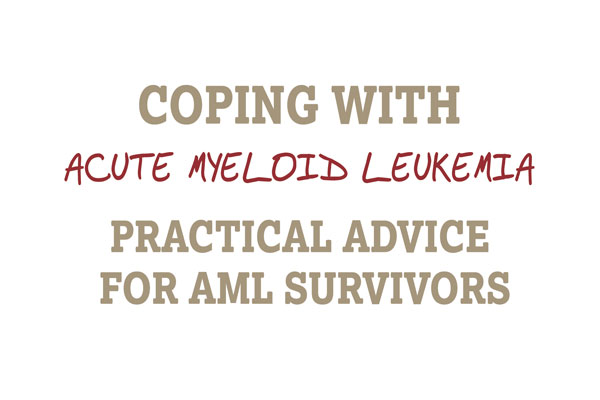Coping with Acute Myeloid Leukemia
Practical Advice for AML Survivors
A diagnosis of acute myeloid leukemia, or AML, can leave you and your loved ones feeling uncertain, anxious, and overwhelmed. There are important treatment decisions to make, emotional concerns to manage, and insurance and financial paperwork to organize, among other practical concerns.
It is helpful to keep in mind that there are many sources of information and support for people coping with AML. By learning about this diagnosis and its treatment options, communicating with your healthcare team, and surrounding yourself with a support network, you will be better able to manage your AML and experience a better quality of life.
Understanding Your Diagnosis and Treatment Plan
AML (also called acute myeloid or myelogenous leukemia) is a type of blood cancer that occurs when the bone marrow makes abnormal types of white blood cells, red blood cells, or platelets.
There are a range of treatments for AML, including surgery, chemotherapy, radiation therapy, targeted therapy, and stem cell transplant. If treatment is necessary, ask your healthcare team to recommend reliable resources to learn more. Knowing what to expect can help you feel more in control.
Because AML is a complex condition with complex treatment options, good communication between you and your healthcare team is key.
The Importance of Communicating with Your Healthcare Team
Because AML is a complex condition with complex treatment options, good communication between you and your healthcare team is key. Your oncologist, nurses, and other members of your healthcare team work together to treat your AML. Since medical appointments are the main time you will interact with your team, being as prepared as possible for these visits is important. It will help ensure that you understand your diagnosis and treatment, get answers to your questions, and feel more satisfied with your overall care.
Finding Resources
While AML can present many challenges, keep in mind that you do not need to cope with this diagnosis on your own. Your friends and family are important sources of strength and support. There are also many local and national support services available to assist you.
- Financial Assistance There are many organizations that provide help with medical billing, insurance coverage, and reimbursement issues. There is also financial assistance available to help people who cannot afford the cost of their medications. Good places to start your research are CancerCare’s A Helping Hand (CancerCare.org/helpinghand) and the Medicine Assistance Tool (MedicineAssistanceTool.org).
- Benefits & Entitlements Local and county government agencies can give you information on Social Security, state disability, Medicaid, income maintenance, the Low Income Heating Energy Assistance Program (LIHEAP), and Supplemental Nutrition Assistance Program (SNAP). Check your local phone directory for listings.
- Housing & Lodging The Hope Lodge of the American Cancer Society, the National Association of Hospital Hospitality Houses (nahhh.org), and other organizations provide temporary lodging for families of a person who needs to travel far from their home for treatment. Joe’s House (JoesHouse.org) is a nonprofit organization that offers an online database with lodging information near cancer treatment centers across the U.S.
Getting Emotional Support
Adjusting to and finding ways to cope with an AML cancer diagnosis is an important part of healing, along with treatment. There are many organizations, such as CancerCare, that provide support services to help people affected by cancer. Individual counseling is available to help you learn ways to cope with the emotions and challenges raised by your diagnosis. Support groups can connect you with other cancer survivors in a safe, supportive environment. Cancer affects the whole person and their loved ones, so it’s important to create a support network as part of managing your care.
Questions to Ask Your Doctor
Here are some questions to ask your doctor or nurse to help you understand your treatment and follow-up care:
- What is my specific diagnosis?
- Have you treated other people with my type of cancer?
- What are my treatment options?
- What is the recommended treatment?
- How often will I receive treatment?
- What are the possible side effects?
- What are the possible benefits and risks of this treatment?
- How much will my treatment cost?
- If I have questions during my treatment and my doctor is not available, who can I ask? Who can I call? For example, if you are not available, is a nurse, social worker, or other specialist available?
- Is there any information that I can read about this treatment or procedure?
- Is there anything else I should know?
CancerCare offers free face-to-face, telephone, and online support groups led by professional oncology social workers. To learn more, call (800) 813-4673 or visit CancerCare.org.
Reprinted with permission from CancerCare.org.
This article was published in Coping® with Cancer magazine, September/October 2020.


